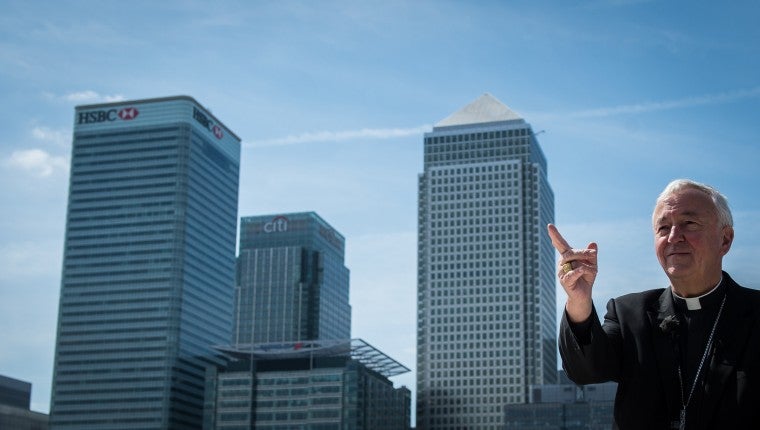Upon reading the much anticipated Papal Encyclical on the environment, Laudato Si’, I found myself immediately looking for ways to get it into the hands of the CEOs I know. While it is a genuinely great read, it is even better as a resource for institutionalizing ethical business principles, and a brilliant illustration of what servant leadership looks like.
There will be many interpretations of this Encyclical. Even before its release, detractors denounced it as political and economic “meddling”, a “rehash”, and a full frontal assault on fossil fuels. But I remain hopeful that more forward-thinking CEOs will hear the deeper ideas he is proposing. Pope Francis is clearly extending an invitation to corporate leaders who authentically wish to be a part of the solution to help heal the world.
In my 25-plus years serving as director of the Justice, Peace and Integrity of Creation Office for my order, the Missionary Oblates of Mary Immaculate, I have helped corporate CEOs and their executives face and mitigate the environmental and social impacts of their global operations. I have done this work in coalition with other investors and members of the Interfaith Center on Corporate Responsibility, who believe that companies that do good in the world, also do well financially.
Through my order’s missionary presence in the world’s most vulnerable communities, I’ve borne witness to how corporations can either choose to alleviate or exacerbate the suffering caused by extreme poverty and inequality. I’ve seen indigenous communities compete for clean, safe water with multi-national mining companies in Oruro Bolivia; how garment workers in Bangladesh have had to choose between feeding their families and risking their lives in unsafe factories, and how unchecked deforestation in the palm oil plantations of Sumatra endangers the survival of numerous species of plants and animals and subjects millions of workers to the scourge of human trafficking and slavery.
I have also borne witness as mining companies build treatment plants to improve water quality in impacted communities in Arequipa, Peru, hailed apparel brands’ decisions to make workers a priority by joining the Bangladesh Accord on Fire and Building Safety and commended the commitment of several food and beverage majors to source only 100 percent sustainable, slavery-free palm oil. These are the choices servant leaders make and their businesses are the better for it.
As I see it, the Pope’s messages for business leaders are as follows:
- Embrace integral ecology: To be good stewards of God’s creation corporations must acknowledge the earth’s finite resources and respect our shared commons. Corporations must account for all externalities, measure their footprints on the planet, and restore harmony to the environment for future generations. Action to drastically reduce carbon emissions and mitigate climate change impacts, especially in vulnerable communities, is imperative.
- Be a leader in addressing inequality where your company operates: Current systems discourage equitable access to land, food, water and capital. Corporate practices that begin with the premise of, not just fairness, but active consideration of those less fortunate, will begin to address global inequality and build healthier, more socially sustainable communities. Business models that are exclusively focused on maximizing profit without integrating social and environmental priorities are inherently inconsistent with the Pope’s concept of justice.
- Respect human rights: The UN Guiding Principles for Business and Human Rights make clear the corporate responsibility to respect and protect human rights and remedy abuses in global supply chains. Corporate human rights policies must include provisions protecting human rights, including the right to water and sanitation, adequate and safe food, and health care services. A global supply chain that is tainted by forced labor or trafficking sanctions human slavery — a sin in any context.
- Be collaborative and transparent in the search for solutions: The systemic transformation this Encyclical is calling for will require a collaborative and inclusive process. This means active consultation with all stakeholders, especially the communities and bioregions most immediately impacted by corporate operations. Respect for the social license to operate that corporations are granted by the societies where they operate must be re-established.
It is my hope, when the din of commentary and debate recedes, that CEOs will find a quiet moment to read the Holy Father’s teaching with an open mind and heart. Laudato Si’ is an urgent reminder of the importance of instilling ethics and reciprocity in the culture of every corporation. A broad consensus of religious leaders have joined Pope Francis in reminding us that the earth is our common home, and that responsibility to care for it extends to all institutions and sectors of society. As leaders you are uniquely positioned to make a significant contribution in response to their message by making the right choices and becoming the servant leaders our world so desperately needs.
This post was originally published at Huffington Post.
Rev. Séamus P. Finn, OMI has been a member of the Justice/Peace and Integrity of Creation Ministry team of the Missionary Oblates of Mary Immaculate since 1986. The office supports the work of the congregation especially the JPIC dimension and is also responsible for the Faith Consistent Investment/Socially Responsible Investment program both for the United States and for the congregation. He is the Chief of Faith Consistent Investing for the OIP Investment Trust.



Leave a Reply